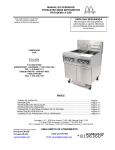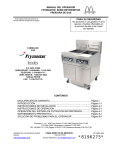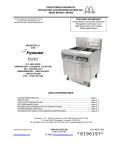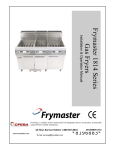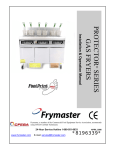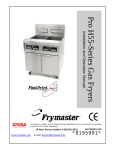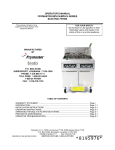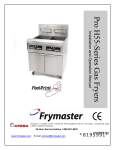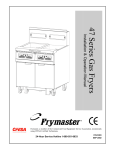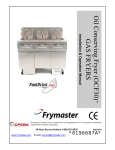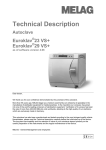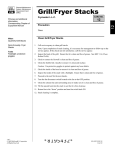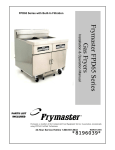Download Hisense SERO7 Tablet User Manual
Transcript
OPERATOR’S MANUAL FRYMASTER BIPH55/MPH55 SERIES GAS FRYER This equipment chapter is to be installed in the Fryer Section of the Equipment Manual. FOR YOUR SAFETY Do Not Store or use gasoline or other flammable vapors and liquids in the vicinity of this or any other appliance. MANUFACTURED BY P.O. BOX 51000 SHREVEPORT, LOUISIANA 71135-1000 PHONE: 1-318-865-1711 TOLL FREE: 1-800-551-8633 1-800-24 FRYER FAX: 1-318-219-7135 TABLE OF CONTENTS WARRANTY STATEMENT ..................................................................................................Page i INTRODUCTION ..................................................................................................................Page 1-1 INSTALLATION INSTRUCTIONS .......................................................................................Page 2-1 OPERATING INSTRUCTIONS ............................................................................................Page 3-1 OPERATING THE BUILT IN FILTRATION SYSTEM ..........................................................Page 4-1 PREVENTIVE MAINTENANCE............................................................................................Page 5-1 OPERATOR TROUBLESHOOTING ....................................................................................Page 6-1 Frymaster, L.L.C. 8700 Line Avenue 71106, 5489 Campus Drive 71129 P.O. Box 51000, Shreveport, Louisiana 71135-1000 TEL 318-865-1711 FAX (Parts) 318-219-7140 (Tech Support) 318-219-7135 PRINTED IN THE UNITED STATES www.frymaster.com SERVICE HOTLINE 1-800-24-FRYER Email: [email protected] OCTOBER 2005 *8196087* NOTICE IF, DURING THE WARRANTY PERIOD, THE CUSTOMER USES A PART FOR THIS ENODIS EQUIPMENT OTHER THAN AN UNMODIFIED NEW OR RECYCLED PART PURCHASED DIRECTLY FROM FRYMASTER DEAN, OR ANY OF ITS AUTHORIZED SERVICE CENTERS, AND/OR THE PART BEING USED IS MODIFIED FROM ITS ORIGINAL CONFIGURATION, THIS WARRANTY WILL BE VOID. FURTHER, FRYMASTER DEAN AND ITS AFFILIATES WILL NOT BE LIABLE FOR ANY CLAIMS, DAMAGES OR EXPENSES INCURRED BY THE CUSTOMER WHICH ARISE DIRECTLY OR INDIRECTLY, IN WHOLE OR IN PART, DUE TO THE INSTALLATION OF ANY MODIFIED PART AND/OR PART RECEIVED FROM AN UNAUTHORIZED SERVICE CENTER. NOTICE This appliance is intended for professional use only and is to be operated by qualified personnel only. A Frymaster DEAN Factory Authorized Service Center (FASC) or other qualified professional should perform installation, maintenance, and repairs. Installation, maintenance, or repairs by unqualified personnel may void the manufacturer’s warranty. See Chapter 1 of this manual for definitions of qualified personnel. NOTICE This equipment must be installed in accordance with the appropriate national and local codes of the country and/or region in which the appliance is installed. See NATIONAL CODE REQUIREMENTS in Chapter 2 of this manual for specifics. NOTICE TO U.S. CUSTOMERS This equipment is to be installed in compliance with the basic plumbing code of the Building Officials and Code Administrators International, Inc. (BOCA) and the Food Service Sanitation Manual of the U.S. Food and Drug Administration. NOTICE Drawings and photos used in this manual are intended to illustrate operational, cleaning and technical procedures and may not conform to onsite management operational procedures. NOTICE TO OWNERS OF UNITS EQUIPPED WITH COMPUTERS U.S. This device complies with Part 15 of the FCC rules. Operation is subject to the following two conditions: 1) This device may not cause harmful interference, and 2) This device must accept any interference received, including interference that may cause undesired operation. While this device is a verified Class A device, it has been shown to meet the Class B limits. CANADA This digital apparatus does not exceed the Class A or B limits for radio noise emissions as set out by the ICES-003 standard of the Canadian Department of Communications. Cet appareil numerique n’emet pas de bruits radioelectriques depassany les limites de classe A et B prescrites dans la norme NMB-003 edictee par le Ministre des Communcations du Canada. DANGER Improper installation, adjustment, maintenance or service, and unauthorized alterations or modifications can cause property damage, injury, or death. Read the installation, operating, and service instructions thoroughly before installing or servicing this equipment. Only qualified service personnel may convert this appliance to use a gas other than that for which it was originally configured. DANGER No structural material on the fryer should be altered or removed to accommodate placement of the fryer under a hood. Questions? Call the Frymaster Dean Service Hotline at 1-800-551-8633. DANGER Adequate means must be provided to limit the movement of this appliance without depending upon the gas line connection. All fryers equipped with casters must be stabilized by installing restraining chains. If a flexible gas line is used, an additional restraining cable must be connected at all times when the fryer is in use. The front ledge of the fryer is not a step! from slips or contact with the hot oil. DANGER Do not stand on the fryer. Serious injury can result DANGER Do not store or use gasoline or other flammable liquids or vapors in the vicinity of this or any other appliance. DANGER Instructions to be followed in the event the operator smells gas or otherwise detects a gas leak must be posted in a prominent location. This information can be obtained from the local gas company or gas supplier. DANGER This product contains chemicals known to the state of California to cause cancer and/or birth defects or other reproductive harm. Operation, installation, and servicing of this product could expose you to airborne particles of glasswool or ceramic fibers, crystalline silica, and/or carbon monoxide. Inhalation of airborne particles of glasswool or ceramic fibers is known to the State of California to cause cancer. Inhalation of carbon monoxide is known to the State of California to cause birth defects or other reproductive harm. DANGER The crumb tray in fryers equipped with a filter system must be emptied into a fireproof container at the end of frying operations each day. Some food particles can spontaneously combust if left soaking in certain shortening material. WARNING Do not bang fry baskets or other utensils on the fryer’s joiner strip. The strip is present to seal the joint between the fry vessels. Banging fry baskets on the strip to dislodge shortening will distort the strip, adversely affecting its fit. It is designed for a tight fit and should only be removed for cleaning. WARNING To ensure the safe and efficient operation of the fryer and hood, the electrical plug for the 120volt line, which powers the hood, must be fully engaged and locked in its pin and sleeve socket. NOTICE The Commonwealth of Massachusetts requires any and all gas products to be installed by a licensed plumber or pipe fitter. WARRANTY STATEMENT Frymaster, L.L.C. makes the following limited warranties to the original purchaser only for this equipment and replacement parts: A. WARRANTY PROVISIONS - FRYERS 1. Frymaster L.L.C. warrants all components against defects in material and workmanship for a period of one year. 2. All parts, with the exception of the frypot, heating elements and fuses, are warranted for one year after installation date of fryer. 3. If any parts, except fuses and filter O-rings, become defective during the first year after installation date, Frymaster will also pay straight-time labor costs to replace the part, plus up to 100 miles/160 km of travel (50 miles/80 km each way). B. WARRANTY PROVISIONS - FRYPOTS (Applies to fryers manufactured after December 1, 2003, only.) 1. Frymaster warrants the frypot assembly for ten years parts and labor. Components attached to the frypot, such as the high-limit, probe, gaskets, seals, ignitors and related fasteners, are also covered by the ten-year warranty if replacement is necessitated by the frypot replacement. Components that are not part of the frypot assembly, such as the blower, gas valve, micro switches, doors and cabinetry are not covered by the frypot warranty. If the frypot is found to be defective, Frymaster will replace the frypot, allowing up to the maximum time per the Frymaster time allowance chart hours of straight-time labor plus up to 100 miles/160 km of travel (50 miles/80 km each way) to change the frypot. 2. This warranty is limited to fryers operating on natural or propane (LP) gas. Fryers that operate on manufactured gas (also known as town gas or high-hydrogen gas) have a lifetime frypot warranty, parts only. C. WARRANTY PROVISIONS – COMBUSTION CHAMBERS (Applies to fryers installed on or after November 1, 1994, only.) 1. Frymaster L.L.C. warrants the combustion chambers against defective material or workmanship for a period of ten years from the original installation date, parts and labor. 2. The combustion chamber consists of the infrared burners and the structural components to mount the burners. This warranty does not cover ancillary components, including the igniter, blower, high-limit thermostat, and temperature probe. 3. This warranty is limited to fryers operating on natural or propane (LP) gas. i D. WARRANTY PROVISIONS - COOKING COMPUTER 1. Frymaster L.L.C. warrants the M-2000 Cooking Computer against defective material or workmanship for a period of three years from the original installation date. If the unit fails within the first year, warranty will cover part and labor. If the part fails the second year, warranty will cover part only. Labor is charged to the store. The third year, warranty will cover the part at a reduced cost of $90.00. No labor or handling will be covered. 2. During this warranty period, Frymaster will replace a returned defective cooking computer with a new or factory rebuilt and functionally operative units. 3. For replacement of defective computers under warranty, call your local Frymaster Authorized Service Center. All computers replaced under the Frymaster exchange program only carry the remaining original warranty. E. PARTS RETURN All defective in-warranty parts must be returned to a Frymaster Authorized Factory Service Center within 60 days for credit. After 60 days, no credit will be allowed. F. WARRANTY EXCLUSIONS This warranty does not cover equipment that has been damaged due to misuse, abuse, alteration, or accident such as: • improper or unauthorized repair (including any frypot which is welded in the field); • failure to follow proper installation instructions and/or scheduled maintenance procedures as prescribed in your MRC cards. Proof of scheduled maintenance is required to maintain the warranty; • improper maintenance; • damage in shipment; • abnormal use; • removal, alteration, or obliteration of either the rating plate or the date code on the heating elements; • operating the frypot without shortening or other liquid in the frypot; • no fryer will be warranted under the ten-year program for which a proper start-up form has not been received. This warranty also does not cover: • transportation or travel over 100 miles/160 km (50 miles/80 km each way), or travel over two hours; • overtime or holiday charges; • consequential damages (the cost of repairing or replacing other property which is damaged), loss of time, profits, use or any other incidental damages of any kind. There are no implied warranties of merchantability or fitness for any particular use or purpose. This warranty is applicable at the time of this printing and is subject to change. ii BIPH55 / MPH55 SERIES GAS FRYER CHAPTER 1: INTRODUCTION 1.1 General Read the instructions in this manual thoroughly before attempting to operate this equipment. This manual covers all configurations of models MPH55 and BIPH55 fryers. Models designated MPH55 do not have built-in filtration systems. Models designated BIPH55 are equipped with FootPrint Pro built-in filtration systems. The fryers in this model family have most parts in common, and when discussed as a group, will be referred to as “Pro Series H55” fryers. Although similar in appearance to the BIH52 McDonald’s fryers, the BIPH55 fryers feature a significantly different built-in filtration system. The new Euro-Look incorporates rounded topcaps and large round drains, which ensures that fries and other debris will be washed into the filter pan. Other features, including the deep cold-zones and easy to clean, open frypots remain essentially unchanged. All Pro Series H55 Gas fryers come standard with M2000 computer, electronic ignition, melt cycle, and boil-out mode. Fryers in this series come in full- or split-vat arrangements, and can be purchased as single units or in batteries of up to five fryers. Pro Series H55 high-efficiency gas fryers employ a unique infrared burner system that uses up to 43% less energy to cook the same volume as conventional open-burner fryers. All Pro Series H55 Gas fryers are of an open-frypot design with no tubes and have a hand-sized opening into the deep cold zone, which makes cleaning the stainless frypot quick and easy. Heating is supplied by a pair of infrared burner assemblies mounted on each side of the frypot. A dedicated blower mounted on the front of the frypot supplies combustion air for the burners. Pro Series H55 Gas fryers can be configured for natural gas, propane (LP), or manufactured gas, as required by the customer. Each frypot is equipped with a temperature probe for precise temperature control. All fryers in this series require an external source of AC electrical power. Units can be configured for voltages ranging from 100 VAC to 240 VAC. BIPH55 and MPH55 fryers are shipped completely assembled. All fryers are shipped with a package of standard accessories. Each fryer is adjusted, tested, and inspected at the factory before crating for shipment. This appliance is only for professional use and shall be used by qualified personnel only, as defined in Section 1.6. 1-1 1.2 Safety Information Before attempting to operate your unit, read the instructions in this manual thoroughly. Throughout this manual, you will find notations enclosed in double-bordered boxes similar to the ones that follow. CAUTION CAUTION boxes contain information about actions or conditions that may cause or result in a malfunction of your system. WARNING WARNING boxes contain information about actions or conditions that may cause or result in damage to your system, and which may cause your system to malfunction. DANGER DANGER boxes contain information about actions or conditions that may cause or result in injury to personnel, and which may cause damage to your system and/or cause your system to malfunction. Your fryer is equipped with automatic safety features: 1. High temperature detection shuts off gas to the burner assembly should the controlling thermostat fail. 2. A safety switch built into the drain valve on units with filter systems prevents burner ignition with the drain valve even partially open. 1.3 Computer Information for the M2000 Computers FCC COMPLIANCE This equipment has been tested and found to comply with the limits for a Class A digital device, pursuant to Part 15 of the FCC rules. While this device is a verified Class A device, it has been shown to meet the Class B limits. These limits are designed to provide reasonable protection against harmful interference when the equipment is operated in a commercial environment. This equipment generates, uses and can radiate radio frequency energy and, if not installed and used in accordance with the instruction manual, may cause harmful interference to radio communications. Operation of the equipment in a residential area is likely to cause harmful interference in which case the user will be required to correct the interference at his own expense. The user is cautioned that any changes or modifications not expressly approved by the party responsible for compliance could void the user's authority to operate the equipment. If necessary, the user should consult the dealer or an experienced radio and television technician for additional suggestions. 1-2 The user may find the following booklet prepared by the Federal Communications Commission helpful: "How to Identify and Resolve Radio-TV Interference Problems". This booklet is available from the U.S. Government Printing Office, Washington, DC 20402, Stock No. 004-000-00345-4. 1.4 European Community (CE) Specific Information The European Community (CE) has established certain specific standards regarding equipment of this type. Whenever a conflict exists between CE and non-CE standards, the information or instructions concerned are identified by means of shadowed boxes. 1.5 Installation, Operating, and Service Personnel Operating information for Frymaster equipment has been prepared for use by qualified and/or authorized personnel only, as defined in Section 1.6. All installation and service on Frymaster equipment must be performed by qualified, certified, licensed, and/or authorized installation or service personnel, as defined in Section 1.6. 1.6 Definitions QUALIFIED AND/OR AUTHORIZED OPERATING PERSONNEL Qualified/authorized operating personnel are those who have carefully read the information in this manual and have familiarized themselves with the equipment functions, or who have had previous experience with the operation of the equipment covered in this manual. QUALIFIED INSTALLATION PERSONNEL Qualified installation personnel are individuals, firms, corporations, and/or companies which, either in person or through a representative, are engaged in and are responsible for the installation of gasfired appliances. Qualified personnel must be experienced in such work, be familiar with all gas precautions involved, and have complied with all requirements of applicable national and local codes. QUALIFIED SERVICE PERSONNEL Qualified service personnel are those who are familiar with Frymaster equipment and who have been authorized by Frymaster, L.L.C. to perform service on the equipment. All authorized service personnel are required to be equipped with a complete set of service and parts manuals, and to stock a minimum amount of parts for Frymaster equipment. A list of Frymaster Factory Authorized Service Centers (FASC) is included with the fryer when shipped from the factory. Failure to use qualified service personnel will void the Frymaster warranty on your equipment. 1-3 1.7 Shipping Damage Claim Procedure Your Frymaster equipment was carefully inspected and packed before leaving the factory. The transportation company assumes full responsibility for safe delivery upon its acceptance of the equipment for transport. What to do if your equipment arrives damaged: 1. File a claim for damages immediately, regardless of the extent of damages. 2. Inspect for and record all visible loss or damage, and ensure that this information is noted on the freight bill or express receipt and is signed by the person making the delivery. 3. Concealed loss or damage that was unnoticed until the equipment was unpacked should be recorded and reported to the freight company or carrier immediately upon discovery. A concealed damage claim must be submitted within 15 days of the date of delivery. Ensure that the shipping container is retained for inspection. Frymaster 1.8 DOES NOT ASSUME RESPONSIBILITY FOR DAMAGE OR LOSS INCURRED IN TRANSIT. Parts Ordering and Service Information For non-routine maintenance or repairs, or for service information, contact your local Frymaster Authorized Service Center (FASC). In order to assist you quickly, the Frymaster Factory Authorized Service Center (FASC) or Service Department representative requires certain information about your equipment. Most of this information is printed on a data plate affixed to the inside of the fryer door. Part numbers are found in the Installation, Operation, Service, and Parts Manual. Parts orders may be placed directly with your local FASC or distributor. Included with fryers when shipped from the factory is a list of Frymaster FASCs. If you do not have access to this list, contact the Frymaster Service Department at 1-800-551-8633 or 1-318-865-1711. When ordering parts, the following information is required: Model Number: Serial Number: Type of Gas or Voltage: Item Part Number: Quantity Needed: 1-4 Service information may be obtained by contacting your local FASC/Distributor. Service may also be obtained by calling the Frymaster Service Department at 1-800-551-8633 or 1-318-865-1711. When requesting service, please have the following information ready: Model Number: Serial Number: Type of Gas: In addition to the model number, serial number, and type of gas, please be prepared to describe the nature of the problem and have ready any other information that you think may be helpful in solving your problem. RETAIN AND STORE THIS MANUAL IN A SAFE PLACE FOR FUTURE USE. 1-5 BIPH55 / MPH55 SERIES GAS FRYER CHAPTER 2: INSTALLATION INSTRUCTIONS 2.1 General Installation Requirements Qualified, licensed, and/or authorized installation or service personnel, as defined in Section 1.6 of this manual, should perform all installation and service on Frymaster equipment. Conversion of this appliance from one type of gas to another should only be performed by qualified, licensed, and/or authorized installation or service personnel as defined in Section 1.6 of this manual. Failure to use qualified, licensed, and/or authorized installation or service personnel (as defined in Section 1.6 of this manual) to install, convert to another gas type or otherwise service this equipment will void the Frymaster warranty and may result in damage to the equipment or injury to personnel. Where conflicts exist between instructions and information in this manual and local or national codes or regulations, installation and operation shall comply with the codes or regulations in force in the country in which the equipment is installed. DANGER Building codes prohibit a fryer with its open tank of hot oil being installed beside an open flame of any type, including those of broilers and ranges. Upon arrival, inspect the fryer carefully for visible or concealed damage. (See Shipping Damage Claim Procedure in Section 1.7 of this manual.) DANGER Frymaster appliances equipped with legs are for stationary installations. Appliances fitted with legs must be lifted during movement to avoid damage to the appliance and bodily injury. For movable installations, optional equipment casters must be used. Questions? Call 1-800-551-8633. 2.1.1 CLEARANCE AND VENTILATION The fryer(s) must be installed with a 6” (150 mm) clearance at both sides and back when installed adjacent to combustible construction; no clearance is required when installed adjacent to noncombustible construction. A minimum of 24” (600 mm) clearance should be provided at the front of the fryer. WARNING Do not block the area around the base or under the fryers. 2-1 DANGER No structural material on the fryer should be altered or removed to accommodate placement of the fryer under a hood. Questions? Call the Frymaster Dean Service Hotline at 1-800-551-8633. One of the most important considerations of efficient fryer operation is ventilation. Make sure the fryer is installed so that products of combustion are removed efficiently, and that the kitchen ventilation system does not produce drafts that interfere with burner operation. The fryer flue opening must not be placed close to the intake of the exhaust fan, and the fryer must never have its flue extended in a “chimney” fashion. An extended flue will change the combustion characteristics of the fryer, causing longer recovery time. It also frequently causes delayed ignition. To provide the airflow necessary for good combustion and burner operation, the areas surrounding the fryer front, sides, and rear must be kept clear and unobstructed. DANGER This appliance must be installed with sufficient ventilation to prevent the occurrence of unacceptable concentrations of substances harmful to the health of personnel in the room in which it is installed. Fryers must be installed in an area with an adequate air supply and adequate ventilation. Adequate distances must be maintained from the flue outlet of the fryer to the lower edge of the ventilation filter bank. Filters should be installed at an angle of 45º. Place a drip tray beneath the lowest edge of the filter. For U.S. installation, NFPA standard No. 96 states, “A minimum distance of 18 in. (450 mm) should be maintained between the flue outlet and the lower edge of the grease filter.” Frymaster recommends that the minimum distance be 24 in. (600 mm) from the flue outlet to the bottom edge of the filter when the appliance consumes more than 120,000 BTU per hour. For installations in the United States, information on construction and installation of ventilating hoods can be found in the NFPA standard cited above. A copy of the standard may be obtained from the National Fire Protection Association, Battery March Park, Quincy, MA 02269. 2.1.2 NATIONAL CODE REQUIREMENTS The type of gas for which the fryer is equipped is stamped on the data plate attached to the inside of the fryer door. Connect a fryer stamped “NAT” only to natural gas, those stamped “PRO” only to propane gas, and those stamped “MFG” only to manufactured gas. Installation shall be made with a gas connector that complies with national and local codes, and, where applicable, CE codes. Quick-disconnect devices, if used, shall likewise comply with national, local, and, if applicable, CE codes. 2.1.3 ELECTRICAL GROUNDING REQUIREMENTS All electrically operated appliances must be grounded in accordance with all applicable national and local codes, and, where applicable, CE codes. All units (cord connected or permanently connected) should be connected to a grounded power supply system. A wiring diagram is located on the inside of the fryer door. Refer to the rating plate on the inside of the fryer door for proper voltages. 2-2 DANGER This appliance is equipped with a special (grounding) plug for your protection against electrical shock, and must be plugged directly into a properly grounded receptacle. Do not cut, remove, or otherwise bypass the grounding prong on this plug! DANGER This appliance requires electrical power for operation. Place the gas control valve in the OFF position in case of a prolonged power outage. Do not attempt to operate this appliance during a power outage. WARNING To ensure the safe and efficient operation of the fryer and hood, the electrical plug for the 120-volt line, which powers the hood, must be fully engaged and locked in its pin and sleeve socket. 2.1.4 Australian Requirements To be installed in accordance with AS 5601 / AG 601, local authority, gas, electricity, and any other relevant statutory regulations. 2.2 Caster Installation Depending upon the specific configuration ordered, your fryer may have been shipped without installed casters. DO NOT INSTALL THIS APPLIANCE WITHOUT CASTERS. If the appliance requires the installation of casters, install them in accordance with the instructions included in your accessory package. 2.3 Pre-Connection Preparations DANGER DO NOT connect this appliance to the gas supply before completing each step in this section. After the fryer has been positioned under the exhaust hood, ensure the following has been accomplished: 1. Adequate means must be provided to limit the movement of fryers without depending upon the gas line connections. If a flexible gas hose is used, a restraining cable must be connected at all times when the fryer is in use. The restraining cable and installation instructions are packed with the flexible hose in the accessories box that was shipped with your unit. 2. Single unit fryers must be stabilized by installing restraining chains on fryers equipped with casters. Follow the instructions in the accessory pack to install the chains. 2-3 DANGER The appliance area must be kept free and clear of combustible material at all times. 3. Frymaster recommends that the minimum distance from the flue outlet to the bottom edge of the hood be 24 in. (600 mm) when the appliance consumes more than 120,000 BTU per hour. NOTE: There are no built-in leveling devices on fryers equipped with casters. The floor where the fryer is to be installed must be level. 4. Test the fryer electrical system: a. Plug the fryer electrical cord(s) into a grounded electrical receptacle. NOTE: To ensure the safe and efficient operation of the fryer and hood, the electrical plug for the 120-volt line, which powers the hood, must be fully engaged and locked in its pin and sleeve socket. b. Place the power switch in the ON position. • • For fryers having computers, verify that the display indicates OFF. If the store is equipped with a hood interlock system, the hood exhaust fan should be on. If not, the store hood interlock system is improperly wired and must be corrected. c. Place the fryer power switch in the OFF position. Verify that the power and heat lights are out. 5. Refer to the data plate on the inside of the fryer door to determine if the fryer burner is configured for the proper type of gas before connecting the fryer quick-disconnect device or piping from the gas supply line. 6. Verify the minimum and maximum gas supply pressures for the type of gas to be used in accordance with the accompanying tables. CE Standard for Incoming Gas Pressures for Fryers Manufactured After April 1999 Pressure (1) Orifice Diameter Single Dual Vat Vat Regulator Pressure Single Dual Vat Vat Gas G20 (mbar) 20 2 x 3.40 2 x 3.40 7 mbar 7 mbar G25 20 or 25 2 x 3.40 2 x 3.40 10 mbar 10 mbar G30 G31 28/30 or 50 2 x 2.05 2 x 2.05 37 or 50 2 x 2.05 2 x 2.05 (1) mbar = 10,2 mm H2O 2-4 17 mbar 17 mbar 20 mbar 20 mbar Non-CE Standard for Incoming Gas Pressures Gas Natural LP Minimum 6" W.C. 1.49 kPa 14.93 mbar Maximum 14" W.C. 3.48 kPa 34.84 mbar 11" W.C. 2.74 kPa 27.37 mbar 14" W.C. 3.48 kPa 34.84 mbar 7. For fryers equipped with a FootPrint Pro system (BIPH55 models) plug the electrical cord(s) into a power receptacle behind the fryer. 2.4 Connection to Gas Line DANGER Before connecting new pipe to this appliance, the pipe must be blown out thoroughly to remove all foreign material. Foreign material in the burner and gas controls will cause improper and dangerous operation. DANGER When pressure-testing incoming gas supply lines, disconnect the fryer from the gas line if the test pressure will be ½ PSIG (3.45 kPa, 13.84 inches W.C.) or greater to avoid damage to the fryer’s gas tubes and gas valve(s). DANGER All connections must be sealed with a joint compound suitable for the gas being used and all connections must be tested with a solution of soapy water before lighting any pilots. Never use matches, candles, or any other ignition source to check for leaks. If gas odors are detected, shut off the gas supply to the appliance at the main shut-off valve and immediately contact the local gas company or an authorized service agency for service. DANGER “Dry-firing” your unit will cause damage to the frypot and can cause a fire. Always ensure that melted shortening, cooking oil, or water is in the frypot before firing the unit. The size of the gas line used for installation is very important. If the line is too small, the gas pressure at the burner manifold will be low. This may cause slow recovery and delayed ignition. The incoming gas supply line should be a minimum of 1½” (38 mm) in diameter. Refer to the chart on the following page for the minimum sizes of connection piping. 2-5 Gas Connection Pipe Sizes (Minimum incoming pipe size should be 1 1/2" (41 mm)) Gas Natural Single Unit 3/4" (22 mm) Propane 1/2" (15 mm) Manufactured • 1" (28 mm) 2 - 3 Units 1" (28 mm) 4 or more units* 1 1/4" (36 mm) 3/4" (22 mm) 1" (28 mm) 1 1/4" (36 mm) 1 1/2" (41 mm) For distances of more than 20 feet (6 m) and/or more than 4 fittings or elbows, increase the connection by one pipe size. The Pro Series H55 gas fryer has received the CE mark for the countries and gas categories indicated in the table below. NOTE: The nominal heat input (QN) is 21kW except for AT, DE, LU and category 3P/B, which is 23kW. CE Approved Gas Categories by Country COUNTRIES CATEGORIES AUSTRIA (AT) II2H3B/P BELGIUM (BE) I2E(R)B I3+ DENMARK (DK) II2H3B/P II2Esi3+ FRANCE (FR) II2Esi3P FINLAND (FI) GERMANY (DE) II2H3B/P II2ELL3B/P I3P GREECE (GR) II2H3+ ITALY (IT) II2H3+ IRELAND (IE) II2H3+ LUXEMBOURG (LU) II2E3B/P II2L3P NETHERLANDS (NL) II2L3B/P NORWAY (NO) I3B/P PORTUGAL (PT) II2H3+ II2H3+ SPAIN (ES) II2H3P SWEDEN (SE) UNITED KINGDOM (UK) II2H3B/P II2H3+ 2-6 GAS G20 G30, G31 G20, G25 G30, G31 G20 G30, G31 G20, G25 G30, G31 G20, G25 G31 G20 G30, G31 G20, G25 G30, G31 G31 G20 G30, G31 G20 G30, G31 G20 G30, G31 G20 G30, G31 G25 G31 G25 G30, G31 G30, G31 G20 G30, G31 G20 G30, G31 G20 G31 G20 G30, G31 G20 G30, G31 PRESSURE (MBAR) 20 50 20, 25 28-30, 37 20 30 20, 25 28-30, 37 20, 25 50 20 30 20 50 50 20 28-30, 37 20 28-30, 37 20 28-30, 37 20 50 25 50 25 30 30 20 28-30, 37 20 28-30, 37 20 37, 50 20 30 20 28-30, 37 CE Standard Required airflow for the combustion air supply is 2m3/h per kW. 1. Connect the quick-disconnect hose to the fryer quick-disconnect fitting under the front of the fryer and to the building gas line. NOTE: Some fryers are configured for a rigid connection to the gas supply line. These units are connected to the gas supply line at the rear of the unit. When using thread compound, use very small amounts on male threads only. Use a pipe thread compound that is not affected by the chemical action of LP gases (Loctite™ PST56765 Sealant is one such compound). DO NOT apply compound to the first two threads. Doing so may allow some of the compound to enter the gas stream, resulting in clogging of burner orifices and/or the control valve. 2. Open the gas supply to the fryer and check all piping, fittings, and gas connections for leaks. A soap solution should be used for this purpose. 3. Close the fryer drain valve and fill the frypot with water and boil-out solution to the bottom OIL LEVEL line at the rear of the frypot. Light the fryer and perform the boil-out procedures that are described in the “Lighting Instructions” and “Boiling Out the Frypot” topics found in Chapter 3 of this manual. DANGER “Dry-firing” your unit will cause damage to the frypot and can cause a fire. Always ensure that melted shortening, cooking oil, or water is in the frypot before firing your unit. 4. The burner manifold pressure should be checked at this time by the local gas company or an authorized service agent. The tables below and on the following page list the burner manifold gas pressures for the various gas types that can be used with this equipment. CE Standard Burner Manifold Gas Pressures for Fryers Manufactured After April 1999 Pressure (mbar) Gas Natural Gas Lacq (G20) under 20 mbar Natural Gas Groningue * (G25) under 25 mbar Natural Gas Groningue (G25) under 20 mbar Butane (G30) at 28/30 or 50 mbar Propane (G31) under 37 or 50 mbar Single Vat Dual Vat 7 7 10 10 10 10 17 17 20 20 * Belgian G25 = 7,0 mbar (single or dual) 2-7 Non-CE Sta nda rd Burne r Ma nifold Ga s Pre ssure s Gas Pr e s s ur e 3" W.C. 0.73 kPa 8.25" W.C. 2.5 kPa Natural Propane 5. Check the programmed temperature thermostat setting. (Refer to the separate M2000 Manual furnished with your unit for the setpoint programming instructions for your particular controller.) 2.5 Converting to Another Gas Type DANGER This appliance was configured at the factory for a specific type of gas. Converting from one type of gas to another requires the installation of specific gas-conversion components. Switching to a different type of gas without installing the proper conversion components may result in fire or explosion. NEVER ATTACH THIS APPLIANCE TO A GAS SUPPLY FOR WHICH IT IS NOT CONFIGURED! Conversion of this appliance from one type of gas to another should only be performed by qualified, licensed, and authorized installation or service personnel, as defined in Section 1.6 of this manual. Pro Series H55 gas fryers manufactured for Non-CE countries use different burners for each type gas. The burners in fryers built for propane gas have a special gray-colored coating on the burner tiles to enable them to withstand the higher caloric value of the propane gas. Burners designed for use in propane units may be used in natural gas applications, but not vice versa. Non-CE Gas Conversion Kits Natural Gas to Propane (LP) Gas Propane (LP) Gas to Natural Gas Full Vat: Part Number 826-1145 Full Vat: Part Number 826-1146 Dual Vat: Part Number 826-1147 Dual Vat: Part Number 826-1148 Units manufactured for export to CE countries are equipped with “universal” burners that may be used with either natural (G20, G25) gas or butane (G30) and propane (G31) gasses. 2-8 CE GAS CONVERSION INSTRUCTIONS 1. Between G20- and G25-type natural gas, adjust the gas pressure at the regulator. (Refer to the CE Standard Burner Manifold Gas Pressure Chart.) Do not change the orifice. 2. Between a 2nd family (G20 or G25) and a 3rd family gas (G30 butane or G31 propane): a. Change the orifices. b. Adjust the manifold pressure. 3. Affix the new label include with the conversion kit next to the existing rating plate stating that the gas type has been converted. Remove any references to the previously used gas from the existing rating plate. Conversion rating label PN 802-2144. 4. If the destination language changes, replace the labels. Call your local service agency or KES for a label kit. The language of reference will be on the corner of the label. 2.6 After the Fryers Are Positioned At the Frying Station 1. Once the fryer has been positioned at the frying station, use a carpenter’s level placed across the top of the frypot to verify that the unit is level, both side-to-side and front-to-back. To level fryers, adjust the casters being careful to ensure the fryer(s) are at the proper height in the frying station. DANGER Hot oil can cause severe burns. Avoid contact. Under all circumstances, oil must be removed from the fryer before attempting to move it to avoid spills, falls, and severe burns. Fryers may tip and cause personal injury if not secured in a stationary position. 2. Close fryer drain-valve(s) and fill frypot with water to the bottom oil level line. 3. Boil out frypot(s) in accordance with the instructions in Section 5.3.2.1 of this manual. 4. Drain, clean, and fill frypot(s) with cooking oil. (See Equipment Setup and Shutdown Procedures in Chapter 3.) 2-9 BIPH55 / MPH55 SERIES GAS FRYER CHAPTER 3: OPERATING INSTRUCTIONS FINDING YOUR WAY AROUND THE BIPH55 SERIES GAS FRYER Flue Cap Basket Hangers Flue Control Panel (M2000 Computer Shown) Top Cap Gas Valve Gas Valve Combustion Blower Filter Control Handles Drain Handles Combustion Blower FootPrint Pro Built-in Filtration Unit TYPICAL CONFIGURATION (BIPH255 SHOWN) NOTE: The appearance of your fryer may differ slightly from that shown depending upon configuration and date of manufacture. 3-1 3.1 Equipment Setup and Shutdown Procedures WARNING The on-site supervisor is responsible for ensuring that operators are made aware of the inherent hazards of operating a hot oil filtering system, particularly the aspects of oil filtration, draining and cleaning procedures. CAUTION If this is the first time the fryer is being used after installation, refer to the frypot BoilOut Procedure in Section 5.3.2.1 of this manual. CAUTION The oil/shortening capacity of the Pro Series gas fryer is 50 lbs. (25 liters) at 70°F (21°C) for a full-vat and 25 lbs. (12.5 liters) at 70°F (21°C) for each half of a dual-vat. Before lighting the fryer, make sure the fryer is OFF and the frypot drain valve(s) is/are closed. Remove the basket support rack(s), if installed, and fill the frypot to the bottom OIL-LEVEL line. If solid shortening is being used, make sure it is packed down into the bottom of the frypot. 3.1.1 Setup WARNING Never operate this appliance with an empty frypot. The frypot must be filled with water or oil/shortening before lighting the burners. Failure to do so will damage the frypot and may cause a fire. DANGER Remove all drops of water from the frypot before filling with oil. Failure to do so will cause spattering of hot liquid when the oil is heated to cooking temperature. 1. Fill the frypot with cooking oil to the bottom OIL LEVEL line located on the rear of the frypot. This will allow for oil expansion as heat is applied. Do not fill cold oil any higher than the bottom line; overflow may occur as heat expands the oil. 2. Ensure that the power cord(s) is/are plugged into the appropriate receptacle(s). Verify that the face of the plug is flush with the outlet plate, with no portion of the prongs visible. 3. Ensure that the oil level is at the top OIL LEVEL line when the oil is at its cooking temperature. It may be necessary to add oil to bring the level up to the proper mark, after it has reached cooking temperature. 3-2 3.1.2 Lighting the Fryer 1. Press the computer ON/OFF switch to the OFF position. After placing the ON/OFF switch in the OFF position, turn the gas valve knob to the OFF position. Wait 5 minutes, then turn the knob to the ON postion and proceed with Step 2. OFF ON OFF ON Placing the ON/OFF switch in the OFF position also turns off the gas valve. Wait five minutes before continuing with Step 2, which will also turn on the gas valve. Honeywell For Non-CE Fryers Honeywell For CE Fryers 2. Press the computer ON/OFF switch to the ON position. 3. If the burners fail to light, press the ON/OFF switch to the OFF position and wait 60 seconds. Repeat step 2. 4. The fryer will automatically enter the melt cycle mode if the frypot temperature is below 180ºF (82ºC). (NOTE: During the melt cycle, the burners will repeatedly fire for a few seconds, then go out for a longer period.) When the frypot temperature reaches 180ºF (82ºC), the unit will automatically switch to the heating mode. The burners will remain lit until the frypot temperature reaches the programmed cooking temperature. 5. After the burners have been lit for at least 90 seconds, observe the flames through the burner viewing ports located on each side of the combustion air blower. 1 2 3 4 5 6 7 8 9 0 1 2 3 4 5 6 7 8 9 0 * * + + AB C DEF GHI JKL MNO P QR STU V WX Y ZA BC Left Viewing Ports are behind the motor housings. DE F GHI JK L MNO PQR S TU VWX YZ- Right Viewing Ports The optimum burn is a bright orange-red glow. If a blue flame is observed, or if there are dark spots on a burner face, adjust the air gas mixture as follows: On the side of the blower housing opposite the motor is a plate with a locking nut. Loosen the nut enough to allow the plate to be moved, then adjust the position of the plate to open or close the air intake opening until a bright orange-red glow is obtained. Carefully hold the plate in position and tighten the locking nut. 3-3 3.1.3 Shutdown For short-term shut down during the workday: 1. Place the computer ON/OFF switch in the OFF position and put the frypot covers in place. When shutting the fryers down at closing time: 1. Place the computer ON/OFF switch in the OFF position to turn the fryer off. OFF OFF ON After placing the ON/OFF switch in the OFF position, turn the gas valve knob to the OFF position. Honeywell Placing the ON/OFF switch in the OFF position also turns off the gas valve. ON For Non-CE Fryers Honeywell For CE Fryers 2. Filter the oil and clean the fryers (See Chapters 4 and 5). 3. Place the frypot covers on the frypots. 3.2 Boiling Out the Frypot To ensure that the frypot is free of any contamination resulting from its manufacture, shipping, and handling during installation, the frypot must be boiled out before first use. Refer to Drain and Clean Frypot (page 5-2) for this procedure. 3.3 Operation This fryer is equipped with M2000 computers (illustrated below). Refer to the separate M2000 Computer Operating Instructions furnished with the fryer for the computer programming and operating procedures. M2000 COMPUTER 3-4 BIPH55 / MPH55 SERIES GAS FRYER CHAPTER 4: FILTRATION INSTRUCTIONS 4.1 Introduction The FootPrint Pro filtration system allows the oil in one frypot to be safely and efficiently filtered while the other frypots in a battery remain in operation. Section 4.3 covers preparation of the filter system for use. Operation of the system is covered in section 4.4. WARNING The on-site supervisor is responsible for ensuring that operators are made aware of the inherent hazards of operating a hot oil filtering system, particularly the aspects of oil filtration, draining and cleaning procedures. 4.2 Draining and Manual Filtering DANGER Draining and filtering of oil must be accomplished with care to avoid the possibility of a serious burn. The oil to be filtered is at or near 350°F (177°C). Ensure all hoses are connected properly and drain handles are in their proper position before operating any switches or valves. Wear all appropriate safety equipment when draining and filtering oil. DANGER Allow oil to cool to 100°F (38°C) before draining into an appropriate container for disposal. DANGER Do not drain more than one frypot at a time into the built-in filtration unit to avoid overflow and spillage of hot oil. DANGER When draining oil into a disposal unit or portable filter unit, do not fill above the maximum fill line located on the container. If your fryer is not equipped with a built-in filtration system, the oil must be drained into another suitable container. (For safe, convenient draining and disposal of used oil, Frymaster recommends using the McDonald’s Shortening Disposal Unit (MSDU). The MSDU is available through your local distributor.) 1. Turn the fryer power switch to the OFF position. Screw the drainpipe (provided with your fryer) into the drain valve. Make sure the drainpipe is firmly screwed into the drain valve and that the opening is pointing down. 4-1 2. Position a metal container with a sealable cover under the drainpipe. The metal container must be able to withstand the heat of the oil and hold hot liquids. 3. Open the drain valve slowly to avoid splattering. If the drain valve becomes clogged with food particles, use the Fryer’s Friend (poker-like tool) to clear the blockage. DANGER NEVER attempt to clear a clogged drain valve from the front of the valve! Hot oil or shortening will rush out creating the potential for severe burns. DO NOT hammer on the drain valve with the cleanout rod or other objects. Damage to the ball inside will result in leaks and will void the Frymaster warranty. 4. After draining the oil, clean all food particles and residual oil from the frypot. BE CAREFUL, this material may still cause severe burns if it comes in contact with bare skin. 5. Close the drain valve securely and fill the frypot with clean, filtered or fresh oil or solid shortening to the bottom OIL-LEVEL line. DANGER When using solid shortening, pack the shortening down into the bottom of the frypot. DO NOT operate the fryer with a solid block of shortening sitting in the upper portion of the frypot. This will cause damage to the frypot and may cause a flash fire. 4.3 Preparation for Use with Filter Pad 1. Pull the filter pan out from the cabinet and remove the crumb tray, hold-down ring, filter pad (or paper) and filter screen. (See Figure 1) Clean all components with a solution of McDonald’s All Purpose Concentrate and hot water, then dry thoroughly. The filter pan is equipped with rollers in rails, much like a kitchen drawer. The pan may be removed for cleaning or to gain access to interior components by lifting the front of the pan to disengage the front rollers, then pulling it forward until the rear rollers clear the rails. The pan cover must not be removed except for cleaning, interior access, or to allow a shortening disposal unit (MSDU) to be positioned under the drain. Screen Filter Pad or Filter Paper Crumb Tray Hold-Down Ring Figure 1 4-2 2. Inspect the filter pan connection fitting to ensure that both O-rings are in good condition. (See Figure 2) Inspect the filter connection fitting O-rings. Figure 2 3. Then in reverse order, place the metal filter screen in the center of the bottom of the pan, then lay a filter pad over the screen, ensuring that the textured side of the pad is up. Make sure that the pad is in between the embossed ridges of the filter pan then position the hold down ring on top of the pad. If using filter paper, lay a sheet of filter paper over the top of the pan overlapping on all sides. Position the hold down ring over the filter paper and lower the ring into the pan, allowing the paper to fold up and around the ring as it is pushed to the bottom of the pan. Then sprinkle 8ounces of filter powder over the filter paper. 4. Reinstall the crumb tray at the front of the pan. (See Figure 1) DO NOT use filter powder with the pad! 5. Replace the crumb tray in the filter pan. Push the filter pan back into the fryer, positioning it all the way to the back of the cabinet. The filtration system is now ready for use. 4.4 Operation of the Filter DANGER Draining and filtering of oil must be accomplished with care to avoid the possibility of a serious burn. The oil to be filtered is at or near 350°F (177°C). Ensure drain handles are in their proper position before operating any switches or valves. Wear all appropriate safety equipment when draining and filtering cooking oil. DANGER NEVER attempt to drain oil from the fryer with the burners lit! Doing so will cause irreparable damage to the frypot and may cause a flash fire. Doing so will also void the Frymaster warranty. 1. Turn the fryer power OFF. Drain the frypot into the filter pan by rotating the larger handle valves to the right. If necessary, use the Fryer's Friend cleanout rod to clear the drain from inside the frypot. Open drain valves by rotating handles to the right. DANGER Do not drain more than one full vat or a split vat frypot at a time into the built-in filtration unit to avoid overflow and spillage of hot oil. 4-3 DANGER NEVER attempt to clear a clogged drain valve from the front of the valve! Hot oil will rush out creating the potential for severe burns. DO NOT hammer on the drain valve with the cleanout rod or other objects. Damage to the ball inside will result in leaks and will void the Frymaster warranty. 2. After the oil has drained from the frypot, rotate the filter handle to start the pump and begin the filtering process. There may be a slight delay before the pump activates. Rotate smaller handle to activate filter. 3. The filter pump draws the oil through the filter pad and circulates it back up to and through the frypot during a 5-minute process called polishing. Polishing cleans the oil by trapping solid particles in the filter pad. 4. After the oil is filtered (about 5 minutes), close the drain valve and allow the fryer to refill. Let the filter pump run 15 to 30 seconds after the oil begins to bubble in the frypot then turn the filter off but rotating the handle up. WARNING The filter pump is equipped with a manual reset switch in case the filter motor overheats or an electrical fault occurs. If this switch trips, turn off power to the filter system and allow the pump motor to cool 20 minutes before attempting to reset the switch (see photo below). Filter Pump Reset Switch 5. Ensure the drain valve is fully closed. (If the drain valve is not fully closed, the fryer will not operate.) Turn the fryer ON and allow the oil to reach setpoint. 4-4 DANGER The crumb tray in fryers equipped with a filter system must be emptied into a fireproof container at the end of frying operations each day. Some food particles can spontaneously combust if left soaking in certain shortening material. WARNING Do not bang fry baskets or other utensils on the fryer’s joiner strip. The strip is present to seal the joint between the fry vessels. Banging fry baskets on the strip to dislodge shortening will distort the strip, adversely affecting its fit. It is designed for a tight fit and should only be removed for cleaning. 4.5 Draining and Disposing of Waste Oil When your oil has reached the end of its usable life, drain the oil into an appropriate container for transport to the disposal container. Frymaster recommends the use of the McDonald’s Shortening Disposal Unit (MSDU). NOTE: If using an MSDU built before January 2004, the filter pan cover must be removed to allow the unit to be positioned beneath the drain. To remove the lid, lift up on the front edge and pull it straight out of the cabinet. Refer to the documentation furnished with your disposal unit for specific operating instructions. If a shortening disposal unit is not available, allow the oil to cool to 100°F (38°C), then drain the oil into a metal stockpot or similar metal container. When draining is finished, close the fryer drain valve securely. DANGER Allow oil to cool to 100°F (38°C) before draining into an appropriate container for disposal. When draining oil into a disposal unit, do not fill above the maximum fill line located on the container. 4-5 BIPH55 / MPH55 SERIES GAS FRYER CHAPTER 5: PREVENTIVE MAINTENANCE 5.1 Fryer Preventive Maintenance Checks and Service DANGER The crumb tray in fryers equipped with a filter system must be emptied into a fireproof container at the end of frying operations each day. Some food particles can spontaneously combust if left soaking in certain shortening material. WARNING Use McDonald’s All Purpose Concentrate. Read the directions for use and precautionary statements before use. Particular attention must be paid to the concentration of cleaner and the length of time the cleaner remains on the foodcontact surfaces. 5.2 DAILY CHECKS AND SERVICE 5.2.1 Inspect Fryer and Accessories for Damage Look for loose or frayed wires and cords, leaks, foreign material in frypot or inside cabinet, and any other indications that the fryer and accessories are not ready and safe for operation. 5.2.2 Clean Fryer Cabinet Inside and Out Clean inside the fryer cabinet with dry, clean cloth. Wipe all accessible metal surfaces and components to remove accumulations of oil and dust. Clean the outside of the fryer cabinet with a clean, damp cloth soaked with McDonald’s All Purpose Concentrate, removing oil, dust, and lint from the fryer cabinet. Wipe with a clean, damp cloth. DANGER Never attempt to clean fryer during the cooking process or when the frypot is filled with hot oil. If water comes in contact with oil heated to cooking temperature, it can cause the oil to splatter and severely burn nearby personnel. 5.2.3 Clean the Built-In Filtration System Daily WARNING Never operate the filter system without oil in the system. 5-1 WARNING Never use the filter pan to transport old oil to the disposal area. WARNING Never drain water into the filter pan. Water will damage the filter pump. There are no periodic preventive maintenance checks and services required for your FootPrint Pro Filtration System other than daily cleaning of the filter pan with a solution of hot water and McDonald’s All Purpose Concentrate. If you notice that the system is pumping slowly or not at all, verify that the filter pan screen is on the bottom of the filter pan, with the pad on top of the screen. Verify that the two O-ring(s) on the fitting at the right front of the filter pan are present and in good condition. 5.3 WEEKLY CHECKS AND SERVICE 5.3.1 Clean Behind Fryers Clean behind fryers in accordance with the procedure detailed in maintenance requirement card (MRC) 14A. 5.3.2 Cleaning the Frypot DANGER Never operate the appliance with an empty frypot. The frypot must be filled with water, oil or shortening before lighting the burners. Failure to do so will damage the frypot and may cause a fire. 5.3.2.1 Boiling Out the Frypot Before the fryer is first used, it should be boiled out to ensure that residue from the manufacturing process has been eliminated. Also, during normal usage of your fryer, a deposit of carbonized oil or shortening will gradually form on the inside of the frypot. This deposit must be periodically removed by following the boil-out procedure contained in maintenance requirement card (MRC) 14A to maintain your fryer’s efficiency. Refer to the separate M2000 Computer Operating Instructions furnished with the fryer for specific details on setting up the computer for boil-out operation. DANGER Allow oil to cool to 100ºF (38ºC) or lower before draining to an appropriate container for disposal. WARNING Never leave the fryer unattended during this process. If the solution overflows, press the ON/OFF switch to the OFF position immediately. 5-2 DANGER Ensure that the frypot is completely free of water before filling with oil or shortening. When the oil or shortening is heated to cooking temperature, water in the frypot will cause splattering. 5.3.3 Clean Filter Pan, Detachable Parts and Accessories As with the frypot, a deposit of carbonized oil or shortening will accumulate on the filter pan and detachable parts and accessories such as baskets, sediment trays, or fishplates. Wipe the filter pan and all detachable parts and accessories with a clean dry cloth. Use a cloth dampened with a solution of McDonald’s All Purpose Concentrate to remove accumulated carbonized oil. Rinse and thoroughly dry each part. DO NOT use steel wool or abrasive pads to clean these parts. The scratches that result from such scrubbing make subsequent cleanings more difficult. 5.4 MONTHLY CHECKS AND SERVICE 5.4.1 Check M2000 Computer Set Point Accuracy 1. Insert a good-grade thermometer or pyrometer probe into the oil, with the end touching the fryer temperature-sensing probe. 2. When the computer display shows a series of dashes “----” or a product name (indicating that the frypot contents are within the cooking range), press the switch once to display the temperature of the oil or shortening as sensed by the temperature probe. 3. Press the switch twice to display the set point. 4. Note the temperature on the thermometer or pyrometer. Actual temperature and pyrometer readings should be within ± 5ºF (3ºC) of each other. If not, contact a Factory Authorized Service Center for assistance. 5.5 QUARTERLY CHECKS AND SERVICE 5.5.1 Clean Combustion Air Blower Assembly 1. Disconnect the blower wiring harness and remove the four blower mounting nuts. (See Figure 1 on next page) 5-3 Wiring connection Blower assembly mounting nuts Figure 1 2. Remove the three fasteners that secure the blower motor assembly to the blower housing, and separate the two components. (See Figure 2) Remove these fasteners. Figure 2 3. Wrap the motor with plastic wrap to prevent water from entering it. Spray degreaser or detergent on the blower wheel and the blower housing. Allow it to soak for five minutes. Rinse the wheel and housing with hot tap water, then dry with a clean cloth. (See Figure 3) Wrap the motor and wires with plastic wrap or a plastic bag. Blower Housing Blower Wheel Figure 3 5-4 4. Remove the plastic wrap from the blower motor assembly. Reassemble the blower motor assembly and blower housing. Reinstall the blower assembly in the fryer. 5. Reinstall the blower shield or shield assembly. 6. Light the fryer in accordance with the procedure described in Chapter 3, Section 3.1. 7. After the burners have been lit for at least 90 seconds, observe the flames through the burner viewing ports located on each side of the combustion air blower. (See Figure 4) Left Viewing Port is Behind Motor (NOTE: Blower shield omitted for clarity.) Right Viewing Port Figure 4 The air/gas mixture is properly adjusted when the burner manifold pressure is in accordance with the applicable table on page 2-7 and the burners display a bright orange-red glow. If a blue flame is observed, or if there are dark spots on a burner face, the air/gas mixture requires adjustment. On the side of the blower housing opposite the motor is a plate with one or two locking nuts. Loosen the nut(s) enough to allow the plate to be moved, then adjust the position of the plate to open or close the air intake opening until a bright orange-red glow is obtained. Carefully hold the plate in position and tighten the locking nut(s). SOME CE BLOWER ASSEMBLIES MAY BE CONFIGURED THIS WAY TYPICAL BLOWER ASSEMBLY 5-5 5.6 SEMI-ANNUAL CHECKS AND SERVICE 5.6.1 Clean Gas Valve Vent Tube NOTE: This procedure is not required for fryers configured for export to CE countries. 1. Set the fryer power switch and the gas valve to the OFF position. 2. Carefully unscrew the vent tube from the gas valve. NOTE: The vent tube may be straightened for ease in removal. 3. Pass a piece of ordinary binding wire (.052 inch diameter) through the tube to remove any obstruction. 4. Remove the wire and blow through the tube to ensure it is clear. 5. Reinstall the tube and bend it so that the opening is pointing downward. 5.6.2 Check Burner Manifold Pressure DANGER This task should be performed by qualified service personnel only. Contact your FASC to arrange this service. 5.7 Annual/Periodic System Inspection This appliance should be inspected and adjusted periodically by qualified service personnel as part of a regular kitchen maintenance program. Frymaster recommends that a Factory Authorized Service Technician inspect this appliance at least annually as follows: 5.7.1 Fryer • Inspect the cabinet inside and out, front and rear for excessive oil. • Verify that debris or accumulations of solidified oil or shortening do not obstruct the flue opening. • Verify that burners and associated components (i.e. gas valves, pilot assemblies, ignitors, etc.) are in good condition and functioning properly. Inspect all gas connections for leaks and verify that all connections are properly tightened. • Verify that the burner manifold pressure is in accordance with that specified on the appliance’s rating plate. • Verify that the temperature and high-limit probes are properly connected, tightened and functioning properly, and that probe guards are present and properly installed. 5-6 • Verify that component box components (i.e. computer, transformers, relays, interface boards, etc.) are in good condition and free from oil and other debris. Inspect the component box wiring and verify that connections are tight and that wiring is in good condition. • Verify that all safety features (i.e. drain safety switches, reset switches, etc.) are present and functioning properly. • Verify that the frypot/cookpot is in good condition and free of leaks and that the frypot/cookpot insulation is in serviceable condition. • Verify that wiring harnesses and connections are tight and in good condition. 5.7.2 Built-In Filtration System • Inspect all oil-return and drain lines for leaks and verify that all connections are tight. • Inspect the filter pan for leaks and cleanliness. If there is a large accumulation of crumbs in the crumb basket, advise the owner/operator that the crumb basket should be emptied into a fireproof container and cleaned daily. • Verify that all O-rings and seals are present and in good condition. Replace O-rings and seals if worn or damaged. • Check filtration system integrity as follows: − Verify that filter pan cover is present and properly installed. − With the filter pan empty, place each oil return handle, one at a time, in the ON position. Verify that the pump activates and that bubbles appear in the cooking oil of the associated frypot. − Close all oil return valves (i.e., place all oil return handles in the OFF position). Verify proper functioning of each oil return valve by activating the filter pump using the lever on one of the oil return microswitches. No air bubbles should be visible in any frypot − Verify that the filter pan is properly prepared for filtering, then drain a frypot of oil heated to 350°F (177°C) into the filter pan and close the frypot drain valve. Place the oil return handle in the ON position. Allow all oil to return to the frypot (indicated by bubbles in the cooking oil). Return the oil return handle to the OFF position. The frypot should have refilled in approximately 2 minutes and 30 seconds. 5-7 BIPH55 / MPH55 SERIES GAS FRYER CHAPTER 6: OPERATOR TROUBLESHOOTING 6.1 Introduction This chapter provides an easy reference guide to some of the common problems that may occur during the operation of your equipment. The troubleshooting guides that follow are intended to help you correct, or at least accurately diagnose, problems with your equipment. Although the chapter covers the most common problems reported, you may encounter problems that are not covered. In such instances, the Frymaster Technical Services staff will make every effort to help you identify and resolve the problem. When troubleshooting a problem, always use a process of elimination starting with the simplest solution and working through to the most complex. Most importantly, always try to establish a clear idea of why a problem has occurred. Part of your corrective action involves taking steps to ensure that it doesn’t happen again. If a controller malfunctions because of a poor connection, check all other connections while you’re at it. If a fuse continues to blow, find out why. Always keep in mind that failure of a small component may often be indicative of potential failure or incorrect functioning of a more important component or system. If you are in doubt as to the proper action to take, do not hesitate to call the Frymaster Technical Service Department or your local Frymaster Factory Authorized Service Center for assistance. Before calling a servicer or the Frymaster HOTLINE (1-800-551-8633): • • • • Verify that electrical cords are plugged in and that circuit breakers are on. Verify that gas line quick-disconnects are properly connected. Verify that any gas line cutoff valves are open. Verify that frypot drain valves are fully closed. DANGER Hot oil will cause severe burns. Never attempt to move this appliance when filled with hot oil or to transfer hot oil from one container to another. DANGER This equipment should be unplugged when servicing, except when electrical circuit tests are required. Use extreme care when performing such tests. This appliance may have more than one electrical power supply connection point. Disconnect all power cords before servicing. Inspection, testing, and repair of electrical components should be performed by an authorized service agent only. 6-1 6.2 Troubleshooting Fryers 6.2.1 Computer and Heating Problems PROBLEM PROBABLE CAUSES A. No power to fryer. B. Damaged computer wiring harness. C. Failed Computer No display on the computer. D. A. B. C. Fryer does not heat. D. E. F. Fryer is operating normally, but recovery is slow when cooking. CORRECTIVE ACTION A. Verify that the fryer is plugged in and that the circuit breaker is not tripped. B. Call FASC. C. Call FASC. D. If any component in the power supply system (including the transformer and interface board) fail, power will not be supplied Power supply component or to the computer and it will not interface board has failed. function. Determining which component has failed is beyond the scope of operator troubleshooting. Call FASC. Drain valve not fully closed. A. Press the ON/OFF switch off, close the drain valve(s) completely, then press the ON/OFF switch on. B. Turn the gas valve knob to the Gas valve is not turned on. ON position. C. Verify that any in-line manual shut off valve is open. Verify Manual gas shut off valve closed. that gas main cut off valve is open. D. Verify that the quick-disconnect Improperly connected quickfitting on the flexible gas line is disconnect fitting on gas line. firmly connected to the fryer. E. Verify that combustion air blower is running. If not, call Obstructed or failed combustion FASC for service. If combustion air blower. air blower is functional, clean and adjust per instructions in Chapter 5 of this manual. Damaged computer wiring F. Call FASC. harness or connector. Dirty or obstructed combustion air blower. 6-2 Clean and adjust per instructions in Chapter 5 of this manual. PROBLEM PROBABLE CAUSES CORRECTIVE ACTION A. Dirty or obstructed combustion air A. Clean and adjust per instructions blower. in Chapter 5 of this manual. Fryer is operating normally, but produces a popping sound when burners B. Dirty or obstructed gas valve vent B. Clean per instructions in Chapter tube (non-CE fryers only). 5 of this manual. ignite. C. Malfunctioning combustion air blower. Computer will not go into program mode or some buttons do not actuate. Heat indicator is on and blower is running, but burner will not ignite. 6.3 C. If blower is slow to come up to speed, contact FASC for service. Failed computer. Call FASC. Blown fuse on interface board or ignition module. Replace fuse. Error Messages and Display Problems Problem M2000 display is in wrong temperature scale (Fahrenheit or Celsius). M2000 display shows HI. M2000 display shows HOT. Probable Causes Corrective Action M2000 computers may be programmed to display in either Fahrenheit or Celsius. Refer to the Incorrect display option programmed. separate M2000 Computer Operation Manual for instructions on changing the display. This display will appear only if the fryer is in the non-dedicated mode and the frypot temperature rises 15° (8°C) or more above the Fryer is 15ºF (8ºC) above setpoint. programmed setpoint. This indicates a problem with the temperature control circuitry. Turn the fryer off and call FASC. This in an indication of a malfunction in the temperature Frypot temperature is more than control circuitry, including a 410ºF (210ºC) or, in CE countries, failure of the high limit thermostat. 395ºF (202ºC). Shut the fryer down immediately and call FASC. 6-3 Problem M2000 display shows LOW TEMP. M2000 display shows PROBE FAILURE. M2000 display shows IGNITION FAILURE. M2000 display shows HI-LIMIT. Display shows , heating indicator cycles on and off normally, but burners will not light and blower is not running. Heat indicator off upon initial startup. Display shows , or with alarm sounding. Probable Causes Corrective Action This display is normal when the fryer is first turned on and may appear for a short while if a large Frypot temperature is between 180°F batch of frozen product is added to (82°C) and 315°F (157°C). the frypot. If the display never goes out, the fryer is not heating. Shut the fryer down and call FASC. This indicates a problem within the Problem with the temperature temperature measuring circuitry measuring circuitry including the that is beyond the scope of probe. operator troubleshooting. Shut the fryer down and call FASC. This indicates that the fryer is not heating. It is displayed if the fryer loses its ability to heat oil. It is also displayed when the oil Open drain valve, failed computer, temperature is above 450°F failed transformer, open high-limit (232°C) and the high-limit thermostat. thermostat has opened, halting the heating of the oil. Verify that the drain valves are fully closed. If this does not correct the problem, call your FASC. This is displayed only during a test of the hi-limit circuit and indicates Computer in hi-limit test mode. that the hi-limit has opened properly. Failed computer or damaged computer wiring harness. Call FASC. Failed computer, damaged wiring harness or connector Call FASC 6-4 Problem M2000 display shows HI 2 BAD. 6.4 Probable Causes Computer in hi-limit test mode. Corrective Action This is displayed only during a test of the hi-limit circuit and indicates that the hi-limit has failed. DO NOT OPERATE THE FRYER! Call FASC. Troubleshooting the Built-in Filtration System PROBLEM Pump won’t start. OR Pump stops during filtering. PROBABLE CAUSES A. Thermal overload switch has tripped on an overheated motor. Test: If the pump stopped suddenly during the filtering process, especially if after several filtering cycles, the pump motor has probably overheated. Place the filter handle in the OFF position, allow the pump to cool for at least 45 minutes, and then press the reset button on the pump motor. Attempt to activate the pump. CORRECTIVE ACTION A. If the pump runs normally after resetting the thermal overload switch, the pump was overheated. Always filter with the cooking oil/shortening at or near frying temperature. Allow the pump motor to cool off for about ten minutes after filtering two full frypots one after the other. Check the filter pad between filtering. Replace the pad if there is a large accumulation of sediment. B. Failed filter handle microswitch. Test: If this is a multi-pot fryer, attempt to operate the pump using B. If the switch is loose, tighten the nuts and bolts holding it in place, a different handle. If the pump ensuring that when the handle is starts, the handle microswitch is placed in the ON position, the either out of alignment or has lever on the microswitch is failed. pressed firmly against the switch. When the handle is placed in the If the switch has failed, call ON position, the lever on the FASC. microswitch should be firmly pressed against the switch. If so, the switch has failed. If not, the switch is loose and/or misaligned. 6-5 PROBLEM Continued from Previous page Filter Pump starts, but no transfer takes place or the oil return is very slow. PROBABLE CAUSES C. Blockage in filter pump. CORRECTIVE ACTION C. Pump blockages are usually caused by sediment build-up in the pump due to improperly sized Test: Close the drain valve. Place the or installed filter pad and failure filter handle in the OFF position, to use the crumb screen. Use a allow the pump to cool for at least 45 thin flexible wire to remove the minutes, and then press the reset blockage. If the blockage cannot button on the pump motor. Pull the be removed, call FASC. filter pan from the unit. Activate the pump. If the pump motor hums and then stops, the pump is blocked. Also Ensure that filter pad is of the proper if air or bubbling oil comes out of the size and is installed properly, and that rear flush port, there is a blockage in the crumb screen is used. the filter pan suction tube. A. To properly filter, the oil should be at or near 350°F (177°C). At temperatures lower than this, the A. Cooking oil is too cold for oil becomes too thick to pass filtering. through the filter medium easily, resulting in much slower oil return and eventual overheating of the filter pump motor. B. Improperly installed or prepared B. Remove the oil from the filter pan filter pan components. and replace the filter pad, ensuring that the filter screen is in Test: Close the drain valve. place under the pad. Move the filter handle to the OFF position, pull the filter pan from If this does not correct the the unit. Move the filter handle to problem, the filter suction tube is the ON position. probably blocked. Remove the If a strong stream of air is being blockage using a thin, flexible pumped out of the oil return port, wire. If unable to remove the blockage, call FASC. the problem is with the filter pan components. 6-6 6.6 Replacing the Controller or Controller Wiring Harness 1. Disconnect the fryer from the electrical power supply. 2. The controller bezel is held in place by tabs at the top and bottom. Slide the bezel up to disengage the lower tabs. Then slide the bezel down to disengage the upper tabs. 3. Remove the top two screws in the upper corners of the control panel. 4. Hinge the controller down. Allow it to rest on its hinge tabs to access the 15-pin connector on the Ignition Module back. Ground Wire Wiring Harness Connector 5. Disconnect the 15-pin wiring harness from the back of the controller and, if replacing the harness, disconnect it from the interface board. 6. Use a 5/16” nut driver (P/N 802-0352) to remove the nut and green ground wire from the back of the controller. 7. Remove the controller by lifting it up and out from the hinge slots in the control panel frame. 8. Re-hinge the NEW controller by inserting the tabs on the bottom into the slots on the control frame panel and allow it to rest on the hinge tabs. 9. If replacing the 15-pin connector, do so now. Plug the new 15-pin wiring harness into the interface board with the metal ring on the controller-end of the connector. 10. Connect the 15-pin connector and the green ground wire to the new controller. When the connector is completely engaged, the clips on either side of the connector will snap into place. 11. Move the controller into the closed position against the control panel frame and replace the screws in the top corners. 12. Insert the top tabs on the bezel into the slots on the underside of the top cap. Slide the bezel down to engage the lower tabs in the lower slots. 6-7 THIS PAGE INTENTIONALLY LEFT BLANK Frymaster, L.L.C., 8700 Line Avenue, PO Box 51000, Shreveport, Louisiana 71135-1000 Shipping Address: 8700 Line Avenue, Shreveport, Louisiana 71106 TEL 1-318-865-1711 FAX (Parts) 1-318-219-7140 PRINTED IN THE UNITED STATES FAX (Tech Support) 1-318-219-7135 SERVICE HOTLINE 1-800-551-8633 819-6087 OCT 2005












































